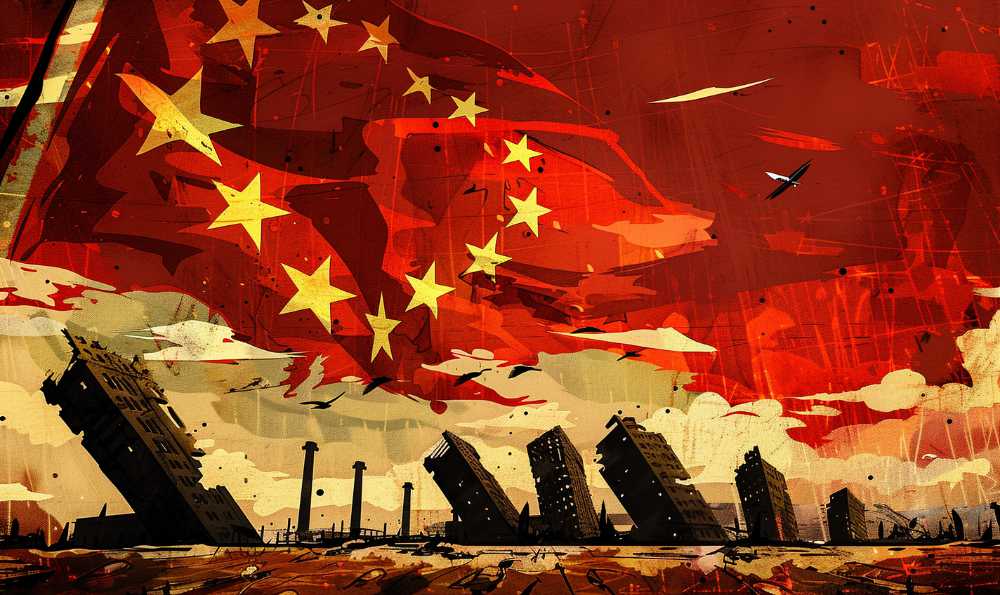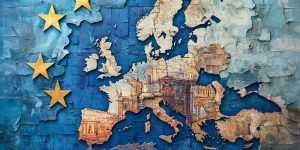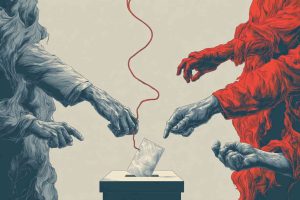The silent masters of money: how the ECB makes Europeans poor

A bank above nations
The European Central Bank (ECB) was founded with the promise of stability, discipline, and independence. It was to be the heart of the euro project, protecting the common currency from political manipulation and reckless national spending. Yet, over the years, the ECB has transformed from a guardian of monetary stability into a political actor of immense power and questionable accountability. Its actions, often disguised as “technical monetary policy, ” have reshaped Europe’s economies and democracies without the consent of its citizens.
The ECB today operates in a moral and democratic vacuum. It prints money, sets interest rates, and buys up government bonds at will. It claims neutrality but behaves as a political body that rewards compliant governments and punishes those who resist Brussels’ orthodoxy. Its officials, unelected and shielded from scrutiny, act as if they were running a private club rather than managing the currency of half a billion people. The very institution that was meant to serve Europeans now serves the financial elite and the political machinery of the European Union itself.
From independence to political instrument
When the ECB was created in 1998, modeled after the German Bundesbank, independence was its core principle. The idea was that politicians could not be trusted with the printing press. The ECB’s sole task was to maintain price stability, meaning to keep inflation low. But that principle collapsed the moment the euro crisis hit in the early 2010s. Faced with insolvent banks and over-indebted southern economies, the ECB abandoned its mandate and began intervening massively in markets.
Under Mario Draghi’s presidency, the famous “whatever it takes” speech in 2012 signaled the end of monetary orthodoxy. The ECB began buying government bonds on a vast scale, effectively financing member states in violation of the European treaties. Officially, these programs were “temporary measures” to maintain stability. In reality, they became a permanent lifeline for politically favored states and banks. The ECB started dictating policy conditions to elected governments, from Greece to Italy, using financial pressure as leverage. Monetary independence morphed into political control.
As economist Hans-Werner Sinn wrote in Die Target-Falle, the ECB’s interventions created enormous imbalances within the euro system. The so-called TARGET2 balances, accounting records between national central banks, show that Germany’s Bundesbank has claims exceeding a trillion euros against the southern eurozone. These are not just numbers on paper, they represent hidden transfer payments from northern taxpayers to the south, facilitated by the ECB’s opaque balance sheet.
The wealth transfer machine
The ECB’s policies have created one of the largest wealth transfers in modern European history. Low and negative interest rates, combined with massive bond purchases, have inflated asset prices, stocks, real estate, and bonds, benefiting the rich while punishing savers. Ordinary Europeans, particularly pensioners and workers, have seen their savings eroded by inflation and low returns. Meanwhile, debt-laden corporations and governments have enjoyed virtually free money.
According to The ECB and inequality in the euro area (S. Adam et al.), quantitative easing has disproportionately benefited the wealthiest households who hold financial assets. The ECB justified this by claiming that higher asset prices would “trickle down” through economic growth. That argument never materialized. Instead, the gap between those who own assets and those who do not has widened dramatically, while living costs across Europe continue to rise.
In countries like Germany and the Netherlands, where saving is culturally ingrained, the ECB’s policies have been particularly destructive. Savers receive negligible interest, while property prices have skyrocketed, making home ownership unattainable for younger generations. Meanwhile, southern countries like Italy and Spain have become addicted to cheap credit. The ECB’s zero-interest regime effectively subsidizes fiscal irresponsibility, ensuring that poorly managed governments can continue borrowing without reforming.
Monetary socialism for the elite
The irony of the ECB’s behavior is that it combines the worst of socialism and crony capitalism. It socializes risk and privatizes profit. When banks or states face collapse, the ECB steps in to buy their bonds, suppress their borrowing costs, and guarantee their survival. Yet when ordinary citizens face financial hardship, inflation, or declining wages, the ECB claims these issues are “outside its mandate.”
The pandemic accelerated this perverse mechanism. Through its Pandemic Emergency Purchase Programme (PEPP), the ECB injected trillions into financial markets. It claimed this was necessary to “maintain stability.” But the main beneficiaries were large corporations and financial institutions, not small businesses or households. The ECB thus created a form of monetary socialism, a system in which the central bank determines winners and losers by deciding whose debts to buy and whose to ignore.
A striking example is how the ECB treated Greece during the debt crisis. When the Greek government tried to resist austerity measures in 2015, the ECB cut off liquidity to Greek banks, forcing the government to capitulate. This was not monetary policy, it was blackmail. The ECB used its control over money supply as a political weapon, showing that no member state could oppose its will without risking economic collapse. As former Greek finance minister Yanis Varoufakis described in Adults in the Room, the ECB acted less like a central bank and more like a colonial authority enforcing the interests of creditors.
A revolving door of power and profit
The corruption of the ECB is not only institutional but also personal. Its leadership and staff move freely between the central bank, major commercial banks, and global financial firms. This revolving door undermines any notion of independence or accountability. Former ECB President Mario Draghi previously worked for Goldman Sachs, the very firm that helped Greece conceal its debt before joining the euro. His successor, Christine Lagarde, was convicted in France for negligence in a multi-million scandal involving public funds before becoming ECB chief.
These figures are not exceptions but symbols of a deeper pattern. The ECB’s upper ranks are filled with former investment bankers, EU technocrats, and IMF officials. They speak the same language, attend the same conferences, and share the same worldview, one where monetary expansion and financialization are the natural state of affairs. Public interest is replaced by market stability, which in practice means protecting large banks and institutional investors.
The ECB’s so-called transparency is a façade. Its decision-making process is opaque, its minutes sanitized, and its accountability mechanisms toothless. Members of the European Parliament can question ECB officials, but they cannot influence policy. National governments, bound by EU treaties, have no authority to overrule or investigate ECB actions. The institution operates above and beyond the reach of democratic control, accountable only to itself.
Inflation and denial
The ECB’s corruption is not always financial; it is often intellectual. When inflation began surging across Europe in 2021 and 2022, ECB officials initially dismissed it as “temporary.” They continued printing money and maintaining negative interest rates even as energy and food prices soared. The result was a cost-of-living crisis unseen in decades. Yet, when inflation became undeniable, the ECB shifted blame to external factors, the pandemic, the war in Ukraine, “supply chain disruptions”, anything but its own policies.
By the time the ECB began raising rates in 2023, inflation had already eroded real incomes and savings across the continent. The bank then claimed credit for “fighting inflation, ” ignoring the fact that it had created the very conditions for it. In The Great Monetary Experiment (C. Goodhart), the author notes that central banks worldwide, including the ECB, became addicted to cheap money policies after 2008, creating bubbles and distortions they could no longer unwind without risking collapse.
Meanwhile, small businesses, households, and even municipalities struggled with rising costs and limited access to credit. The ECB’s belated tightening primarily hurt those at the bottom of the economic hierarchy, while large financial players had already adjusted their positions. Inflation, as always, became a hidden tax on the poor.
The myth of European unity
The ECB is often portrayed as a pillar of European unity. In reality, it has deepened divisions between north and south, creditors and debtors, savers and borrowers. The euro itself, managed by the ECB, has become a source of instability rather than cohesion. The single currency removed the ability of member states to devalue their own currencies in times of crisis. Instead, they must endure internal devaluation, wage cuts, tax increases, and social austerity, dictated by Brussels and Frankfurt.
The ECB’s interventions have entrenched these inequalities. Southern countries are locked into dependency on ECB support, while northern economies shoulder hidden liabilities. The illusion of a common European destiny is maintained only by constant monetary manipulation. Without the ECB’s bond purchases, the eurozone would likely fragment. The supposed “success” of the euro is thus an illusion built on perpetual financial doping.
In EuroTragedy: A Drama in Nine Acts (A. Tooze), the author describes how the euro project was flawed from the beginning, a political currency without a political union. The ECB has become the glue holding this artificial construct together, using money creation to postpone the inevitable reckoning. Its power grows precisely because the system it manages is unsustainable.
How the ECB undermines democracy
Every major decision by the ECB carries political consequences, yet none of them are subject to democratic approval. When it buys government bonds, it influences national budgets. When it sets negative rates, it affects pensions, housing, and wages. When it punishes a government by tightening liquidity, it interferes in domestic politics. But unlike a national parliament, the ECB cannot be voted out or held accountable. Its officials enjoy immunity and long mandates, shielded from public pressure.
This democratic void has been described by economist Wolfgang Streeck in Buying Time as the essence of post-democratic governance: decisions that shape citizens’ lives are made by institutions beyond their reach. The ECB embodies this perfectly. It enforces fiscal discipline and market orthodoxy while pretending to be neutral. It dictates policies through financial instruments rather than open debate.
Even the language used by the ECB reveals this detachment. Terms like “asset purchases, ” “liquidity injections, ” or “forward guidance” mask the reality that the bank is redistributing wealth and deciding economic fates. Its communication strategy is designed to obscure, not clarify. As long as the average citizen remains confused by jargon, the ECB’s power remains unchallenged.
A future of dependency and decay
The long-term consequences of ECB policy are dire. Europe’s economies have become dependent on artificial liquidity. Productivity growth stagnates, investment lags, and innovation declines. Companies survive not because they are efficient but because borrowing is cheap. Governments delay reforms because deficits can be financed indefinitely. The eurozone has entered a state of monetary zombification, where debt grows faster than output and real wealth creation is replaced by financial illusion.
The ECB’s push for a “digital euro” is another step toward centralized control. Presented as a modern and convenient tool, it would give the ECB direct oversight of citizens’ transactions. Combined with the trend toward cashless societies, this could lead to unprecedented surveillance and behavioral control. Under the pretext of efficiency and security, Europeans would surrender the last vestiges of financial autonomy.
Meanwhile, the institution’s own balance sheet remains bloated with trillions of euros in bonds of uncertain value. Any attempt to unwind these holdings risks financial chaos. The ECB is trapped by its own policies, unable to normalize without collapsing the system it created. Its leadership knows this, which is why it continues to speak in abstractions and promises of “stability, ” while quietly preparing for the next intervention.
The cost of blind faith
For decades, Europeans have been told to trust in the competence and neutrality of their central bank. Yet the evidence shows an institution that serves elites, distorts markets, and undermines democracy. The ECB has failed in its original mission of maintaining price stability, failed in promoting sustainable growth, and failed in respecting its legal limits. It has become a political actor hiding behind technocratic language.
The tragedy is that there is no clear mechanism to correct this. The ECB cannot easily be reformed without rewriting EU treaties, which requires unanimity among member states, an impossibility in today’s divided Europe. The only remaining check on its power would be public awareness and political courage. But so far, most European leaders prefer to hide behind the bank’s authority rather than confront it.
In the end, the ECB symbolizes the broader failure of the European project itself: an elite-driven construct imposed from above, detached from the daily realities of its citizens. Its corruption is not just financial but moral, the corruption of purpose, where serving the people has been replaced by serving the system.
A warning for Europe
Europe’s future depends on breaking this cycle of dependency. A central bank should not rule nations. It should not dictate politics or decide who prospers and who suffers. The ECB must be brought back under democratic control, or it will continue to hollow out Europe’s economies and institutions from within.
The lesson of history is clear: no unelected power can dominate indefinitely without eroding legitimacy. The longer the ECB operates as an unaccountable empire of money, the greater the eventual backlash will be. What began as a project to unite Europe through a shared currency may end as the force that tears it apart.


















